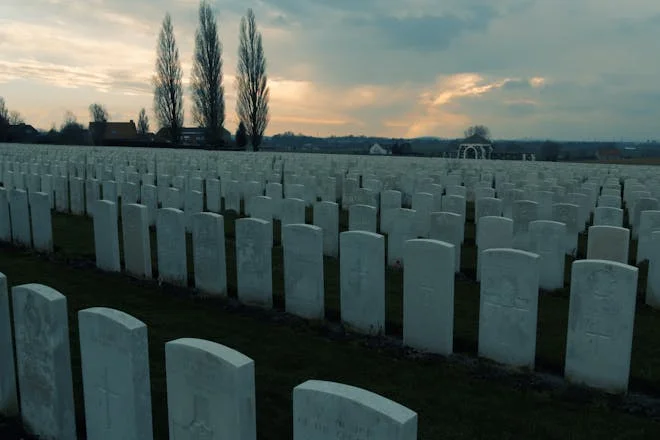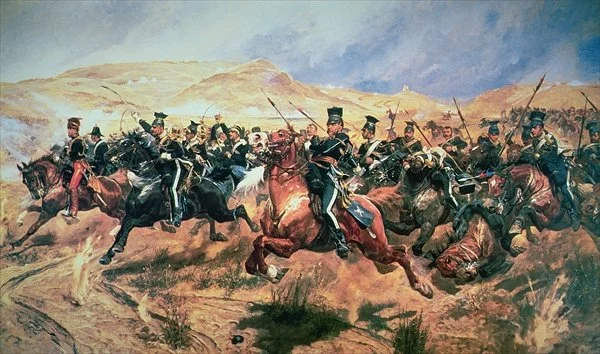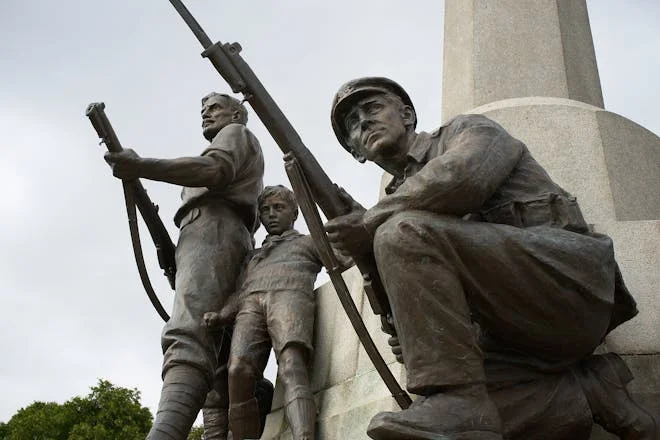
“The Soldier” by Rupert Brooke is one of the most celebrated war poems. It captures the idealism and patriotism of the early 20th century. The poem reflects the sentiments of a generation facing the devastation of World War I while exploring the sacrifice, love for one’s country, and the enduring bond between a soldier and his homeland. In this detailed analysis, we’ll look at the various aspects of this iconic poem. We’ll cover its themes, tone, structure, and literary devices.
The Soldier
By Rupert Brooke
If I should die, think only this of me:
That there’s some corner of a foreign field
That is for ever England. There shall be
In that rich earth a richer dust concealed;
A dust whom England bore, shaped, made aware,
Gave, once, her flowers to love, her ways to roam;
A body of England’s, breathing English air,
Washed by the rivers, blest by suns of home.
And think, this heart, all evil shed away,
A pulse in the eternal mind, no less
Gives somewhere back the thoughts by England given;
Her sights and sounds; dreams happy as her day;
And laughter, learnt of friends; and gentleness,
In hearts at peace, under an English heaven.
Content
- About the Author
- Subject of "The Soldier" by Rupert Brooke
- Context of "The Soldier" by Rupert Brooke
- Theme and Tone of "The Soldier" by Rupert Brooke
- Form and Structure of "The Soldier" by Rupert Brooke
- Persona, Setting, and Narrative of "The Soldier" by Rupert Brooke
- Line-by-Line Analysis of "The Soldier" by Rupert Brooke
- Poetic and Literary Devices Used in "The Soldier" by Rupert Brooke
- Implications and Meanings of "The Soldier" by Rupert Brooke
- FAQ
- What is the central message of “The Soldier” by Rupert Brooke?
- What are the main themes in “The Soldier”?
- What poetic form is used in “The Soldier”?
- Who is the speaker in “The Soldier”?
- What is the setting of “The Soldier”?
- What is the historical context of “The Soldier”?
- How does Brooke personify England in the poem?
- What does the phrase "a richer dust concealed" mean?
- Interactive Summary of "The Soldier" by Rupert Brooke
- Poetic Legacy and Influence of "The Soldier" by Rupert Brooke
About the Author
Rupert Brooke was an English poet known for his idealistic war sonnets written during World War I. Born in 1887, Brooke became a prominent literary figure in the early 20th century. He was educated at Rugby School and King’s College, Cambridge, where he became a part of the literary group that included the likes of Virginia Woolf and E.M. Forster.
Brooke’s poetry is characterized by its romanticism and patriotic fervor. Tragically, he died in 1915 at the age of 27 from sepsis while on his way to the Gallipoli campaign, but his works, especially “The Soldier,” have left an enduring legacy.
Subject of “The Soldier” by Rupert Brooke
“The Soldier” is a deeply patriotic poem that centers on the idea of self-sacrifice for one’s country. It captures the soldier’s deep love and dedication to England. Furthermore, the poem presents his potential death not as a tragedy but as a noble contribution to his homeland. It also imagines the soldier’s body enriching the foreign soil where he falls, establishing a lasting connection between England and the battlefield.
The subject is not just about physical death but also about the eternal connection and spiritual unity between the soldier and his country. By framing his demise as a way to eternally merge with the land he loves, Brooke elevates the concept of dying in war. Thereby, it becomes a form of immortality in the poem. This idealistic view reflects the widespread patriotic sentiment at the beginning of World War I. It portrays war as a righteous endeavor and the soldier’s sacrifice as a sanctified act.
Context of “The Soldier” by Rupert Brooke
Understanding the context of “The Soldier” by Rupert Brooke is crucial in grasping its themes and emotional impact. The poem was written in 1914, just as World War I began. During this period, many young men volunteered for service with widespread enthusiasm and a strong sense of duty. They were motivated by deep patriotism and a desire to uphold honor. The general conception at the time was that the war would be a short and noble endeavor. There was little awareness of the prolonged horrors that would follow.
Rupert Brooke, himself a volunteer, wrote a series of sonnets reflecting this early-war idealism. “The Soldier” is the most famous of these, capturing the spirit of a time when war was seen as a necessary and heroic sacrifice for the greater good. Brooke’s use of imagery and language creates a peaceful and almost romantic portrayal of war. This highlights the noble act of sacrificing one’s life for their country and the eternal peace that comes afterward.
This poem stands in contrast to the later, more cynical war poetry that emerged as the brutal reality of trench warfare became apparent. Poets like Wilfred Owen and Siegfried Sassoon, who experienced the grim realities of battle firsthand, wrote with a tone of disillusionment and horror. Brooke’s work, however, remains a testament to the initial optimism and patriotic fervor that marked the beginning of the conflict.
In “The Soldier,” Brooke speaks to a generation that believed in the righteousness of their cause. The poem captures a time of hope and patriotism before disillusionment sets in, reflecting the spirit of those who eagerly went off to fight. It offers a glimpse into the mindset of a society on the brink of one of the most devastating wars in history.
Theme and Tone of “The Soldier” by Rupert Brooke
Theme
The main theme of “The Soldier” by Rupert Brooke is patriotism, focusing on the strong and lasting bond between a soldier and his homeland. The poem celebrates the idea of self-sacrifice for one’s country, portraying it as the ultimate act of love and devotion. Brooke elevates the concept of dying in war to a noble and eternal union with England, suggesting that the soldier’s spirit will forever enrich the foreign land where he falls. This theme reflects the idealistic and romantic view of war prevalent at the outbreak of World War I.
Another important theme is the idea of achieving immortality through sacrifice. The soldier’s death is depicted not as a loss but as a way to achieve a lasting presence within the beloved homeland. His body, described as “a richer dust,” symbolizes the eternal bond with England, even in death. This idea is interconnected with the broader theme of the spiritual and cultural essence of a nation. Furthermore, it emphasizes how individual sacrifices contribute to the collective identity and memory of a country.
Tone
“The Soldier” radiates a positive and motivating tone. Despite its contemplation of death during wartime, the poem does not condemn it. Instead, it celebrates the courage and sacrifice of soldiers. Brooke’s viewpoint is romantic and idealistic, emphasizing love for one’s country. Brooke’s language and imagery create a tranquil and almost idyllic vision of death, portraying it as a serene and honorable fate.
Additionally, the poem steers clear of grim or harsh depictions of war, choosing to highlight the noble aspects of sacrifice and the deep connection to one’s homeland. This tone reinforces the poem’s themes, presenting a comforting and idealized view of the soldier’s fate.
His optimistic tone evokes feelings of bravery, contentment, and courage. The poem inspires a sense of national pride and portrays war as an opportunity to express devotion to England. While some may find it naïve by today’s standards, it captures a particular type of patriotism prevalent during the early days of World War I.
Form and Structure of “The Soldier” by Rupert Brooke

“The Soldier” by Rupert Brooke is a classic example of a Petrarchan sonnet, a form known for its association with love and admiration. This choice of structure is particularly effective in conveying the poem’s themes of patriotism, sacrifice, and eternal connection to one’s homeland. Let’s break down the form and structure in detail:
Petrarchan Sonnet
The poem consists of 14 lines divided into an octave (the first eight lines) and a sestet (the final six lines). This traditional sonnet form is characterized by a distinct rhyme scheme and a thematic division between the two parts.
Rhyme Scheme
“The Soldier” is crafted in the form of a Petrarchan sonnet, which traditionally consists of an octave and a sestet. However, Brooke’s sonnet deviates slightly from the conventional Petrarchan pattern:
- Octave (ABAB CDCD): The first eight lines follow an ABAB CDCD pattern, which is more characteristic of a Shakespearean sonnet. This section sets up the thematic elements of the poem, introducing the idea of the soldier’s potential death and his eternal bond with England.
- Sestet (EFEF GG): The concluding six lines diverge from the typical Petrarchan sonnet’s CDECDE or CDCDCD rhyme schemes. Instead, Brooke employs an EFEF GG pattern, akin to the closing couplet of a Shakespearean sonnet. This part reflects on the spiritual legacy of the soldier and his contributions to the collective consciousness of England.
Thematic Division
- Octave:
The octave introduces the idea of the soldier’s death and his wish to be remembered as part of England. It focuses on the physical connection between the soldier and his homeland, emphasizing how his body, even in death, will enrich foreign soil with English essence. Brooke uses imagery to describe the soldier’s connection to England, portraying his body as “a richer dust” that has been shaped and blessed by his homeland. - Sestet:
The sestet shifts to a more spiritual perspective, contemplating the soldier’s eternal connection to England. It reflects on the intangible aspects of his identity—his thoughts, dreams, and experiences—shaped by England. The sestet suggests that these elements will continue to exist in a peaceful, idealized afterlife, described as “an English heaven.” This shift from the physical to the spiritual deepens the poem’s exploration of sacrifice and immortality.
Line Length and Meter
“The Soldier” is written in iambic pentameter, a rhythmic pattern consisting of five iambs (an unstressed syllable followed by a stressed syllable) per line. This meter is traditionally associated with English poetry and gives the poem a rhythmic and formal quality, suitable for its elevated subject matter.
Punctuation and Pauses
Brooke uses punctuation effectively to create natural pauses and enhance the poem’s contemplative tone. The frequent use of commas and semicolons allows for a measured, reflective pace, giving readers time to absorb the imagery and emotions conveyed. These pauses contribute to the poem’s serene and thoughtful atmosphere, aligning with its themes of remembrance and eternal connection.
Consistent Rhyme and Meter
The consistent rhyme scheme and meter provide a sense of order and harmony, reflecting the poem’s idealized view of war and sacrifice. Brooke’s utilization of a traditional and familiar form emphasizes the timeless and universal nature of the themes he explores. Furthermore, this approach makes the poem resonate with readers on both emotional and intellectual levels.
Persona, Setting, and Narrative of “The Soldier” by Rupert Brooke
In “The Soldier,” Rupert Brooke adopts the persona of an English soldier during World War I, reflecting the patriotic ideals of pre-war England. The poem’s narrative voice is calm and contemplative, filled with a sense of duty and love for the homeland. The soldier addresses the reader directly, expressing thoughts about the prospect of dying in a foreign land and the spiritual connection to his origins in England.
Setting
The setting of the poem is not a specific battlefield or location but rather a conceptual space where the soldier’s body might lie. It’s a “corner of a foreign field” that becomes forever England through his death. The setting goes beyond physical geography, as the soldier’s final resting place is more about the concept of England itself than the actual land.
Narrative
The narrative unfolds as a single, unified thought—a contemplation of death and its implications. Brooke’s soldier does not express fear or sorrow, but a serene acceptance of his potential fate.
The narrative is a monologue conveying the soldier’s belief that his death would serve a greater purpose by transforming a piece of foreign soil into a part of England. This transformation is both literal and symbolic. The soldier’s body enriches the land, while his spirit rejoins the collective consciousness of his nation.
Line-by-Line Analysis of “The Soldier” by Rupert Brooke
First Stanza
The first stanza of Rupert Brooke’s “The Soldier” sets the tone for the entire poem, establishing its central themes of patriotism and sacrifice. It begins with the soldier contemplating the possibility of his death in a foreign land and the transformation of that land into a piece of England through his demise. The stanza conveys a sense of calm acceptance, as the soldier finds solace in knowing that his body will enrich the foreign soil, forever connecting it to his homeland.
Brooke uses rich imagery to evoke the nurturing qualities of England, which have shaped the soldier’s identity. The land is personified as a mother figure, giving the soldier everything from the air he breathes to the natural beauty he cherishes. This connection to England is portrayed as so deep that even in death, the soldier remains inseparably linked to his country.
The stanza concludes with a reflection on the soldier’s physical and spiritual connection to England, hinting that his sacrifice is both a literal and metaphorical return to the land of his birth.
Lines 1-2
“If I should die, think only this of me:
That there’s some corner of a foreign field”
The poem begins with a hypothetical scenario presented by the soldier, who is contemplating his own death. The use of the conditional “If” suggests that death is not certain but a possibility the soldier is prepared for. The phrase “think only this of me” is a request to remember him not with sadness but with a sense of pride. The “corner of a foreign field” symbolizes the place where he might die. Brooke uses this imagery to convey the idea that even in death, the soldier remains connected to England.
Lines 3-4
“That is for ever England. There shall be
In that rich earth a richer dust concealed;”
Brooke continues the sentiment by declaring that the place where the soldier falls will forever be a part of England. The soldier believes that his presence will forever make that piece of foreign land a part of England. This line reflects the theme of eternal patriotism and his lasting connection to his homeland.
The “rich earth” refers to the soil of the foreign land, which becomes “richer” because it contains the soldier’s remains. The “richer dust” is a metaphor for the soldier’s body, suggesting that the land where he lies will be enriched by his sacrifice. This line highlights the main theme of the poem, which is the idea that the soldier’s death sanctifies the foreign soil with the essence of his homeland.
Lines 5-6
“A dust whom England bore, shaped, made aware,
Gave, once, her flowers to love, her ways to roam;”
The soldier reflects on his life, acknowledging England as the land that raised him (“bore, shaped, made aware”). The soldier’s body, now referred to as “dust,” is described as having been created and nurtured by England. This line emphasizes the soldier’s origin and the deep bond he shares with his homeland.
The mention of “flowers to love” and “ways to roam” represents the soldier’s attachment to the natural beauty and liberties of his homeland. These lines emphasize the nurturing role of England in the soldier’s life, shaping his identity and values.
Lines 7-8
“A body of England’s, breathing English air,
Washed by the rivers, blest by suns of home.”
The stanza concludes with the soldier’s body being described as “of England,” highlighting the inseparable bond between the soldier and his country. The soldier describes himself as an integral part of England, having lived and thrived in its environment. “Breathing English air” and being “washed by the rivers” further personify England as a living entity that has sustained him. The “suns of home” bless him, reinforcing the idea that the soldier’s spirit is intertwined with the English landscape.
In summary, the first stanza of “The Soldier” is a powerful expression of patriotism and the soldier’s close connection to England. Brooke’s use of metaphor and personification creates an image of the soldier’s love for his homeland, which remains undiminished even in the face of death.
Second Stanza
The second stanza of Rupert Brooke’s “The Soldier” shifts from the physical to the spiritual, exploring the soldier’s inner life and the legacy he leaves behind. Here, Brooke reflects on the soldier’s heart and mind, suggesting that in death, the soldier’s essence becomes part of the eternal, collective consciousness of England.
The stanza is filled with imagery portraying happiness and innocence, as seen in references to “happy dreams,” “laughter,” and “hearts at peace.” It concludes with the tranquil idea of “an English heaven.”
This portrayal emphasizes that a patriotic death is not to be mourned but celebrated as an act of devotion to the nation. The poem, therefore, implies that the soldier’s soul will find eternal peace and unity with England, reflecting a serene afterlife.
Lines 9-10
“And think, this heart, all evil shed away,
A pulse in the eternal mind, no less”
In these lines, Brooke shifts the focus from the soldier’s physical body to his spiritual essence. Additionally, these lines suggest a spiritual purification that occurs through the soldier’s sacrifice. The soldier’s heart, freed from all negativity (“all evil shed away”), becomes a metaphorical pulse within the “eternal mind.”
The term “eternal mind” suggests a collective consciousness that transcends individual existence. The soldier’s thoughts, memories, and love for England persist beyond death, contributing to the eternal existence of the nation. This idea of an eternal mind highlights the theme of immortality and the ongoing influence of the soldier’s sacrifice.
Lines 11-12
“Gives somewhere back the thoughts by England given;
Her sights and sounds; dreams happy as her day;”
Brooke emphasizes reciprocity, showing how the soldier’s heart gives back what England has bestowed upon him. His consciousness echoes the thoughts and experiences shaped by his homeland. The phrase “sights and sounds” evokes vivid memories of England—the landscapes, cityscapes, and familiar sounds.
The mention of “dreams happy as her day” reinforces the positive tone, suggesting that even in death, the soldier’s dreams remain joyful and connected to England. This line emphasizes the idea that the soldier’s experiences and memories are deeply intertwined with his national identity, and these elements will persist even after his death. In this way, Brooke highlights the reciprocal relationship between the soldier and his homeland, where his thoughts and experiences become a spiritual tribute to England’s influence on him.
Lines 13-14
“And laughter, learnt of friends; and gentleness,
In hearts at peace, under an English heaven.”
The final lines celebrate the soldier’s emotional connections. His laughter, which he learned from friends, symbolizes camaraderie and shared experiences. The word “gentleness” implies compassion and kindness—the qualities that bind people together.
The closing image of hearts at peace under an “English heaven” reinforces the idea that dying for England is not tragic but a serene transition. Furthermore, it represents the poem’s idealistic and comforting view of death, identifying it as a return to a perfect version of the homeland.
The “English heaven” represents a harmonious afterlife where the soldier’s spirit finds solace. This depiction creates an image of an idyllic, peaceful afterlife where the values and experiences of England continue to flourish.
In summary, the second stanza of “The Soldier” continues to explore themes of patriotism, sacrifice, and eternal connection. Brooke’s language remains positive, emphasizing the soldier’s enduring impact on England’s collective consciousness.
Poetic and Literary Devices Used in “The Soldier” by Rupert Brooke
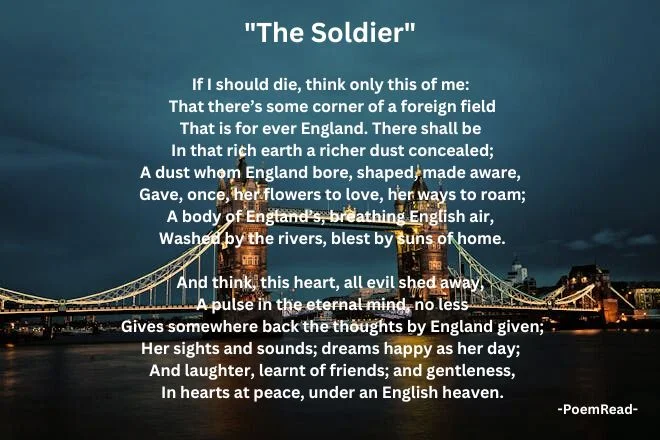
Alliteration
Alliteration is the repetition of consonant sounds at the beginning of words close to each other in a line or verse. Brooke uses alliteration to create a musical quality that emphasizes certain concepts. For example, in the line “Gave, once, her flowers to love, her ways to roam,” the repetition of the ‘w’ sound in “ways” and “roam” draws attention to the soldier’s freedom and the beauty of England.
Caesura
A caesura is a pause in a line of poetry, often marked by punctuation. It can create a dramatic pause or emphasize a particular phrase. In “The Soldier,” a caesura appears in the line “A body of England’s, breathing English air.” The comma after “England’s” creates a reflective pause, emphasizing the soldier’s deep connection to his homeland.
Enjambment
Enjambment occurs when a sentence or phrase runs over from one line to the next without a terminal punctuation mark. This device can convey a sense of continuation or fluidity. Brooke’s use of enjambment, as seen in “That there’s some corner of a foreign field / That is forever England,” allows the thought to flow across lines. This technique mirrors the eternal nature of the soldier’s bond with England.
Metaphor
In “The Soldier,” Brooke uses metaphors to deepen the emotional resonance of the poem. He describes the soldier’s body as “a richer dust concealed,” implying that in death, the soldier becomes part of the earth and enriches it. Another metaphor, “a dust whom England bore,” suggests that the soldier is an intrinsic part of England itself, born from its soil and returning to it in death. These metaphors highlight the eternal connection between the soldier and his homeland, elevating his sacrifice to a sacred union with the land he loves.
Personification
Personification attributes human qualities to non-human entities. In “The Soldier,” England is personified as a mother figure who has nurtured the soldier. This is evident in lines like “A dust whom England bore, shaped, made aware,” where England is depicted as having raised and educated the soldier, imbuing him with her values and culture.
Anaphora
Anaphora is the repetition of a word or phrase at the beginning of successive clauses or lines. Brooke uses this device to emphasize certain ideas and create a rhythmic effect. For example, the repetition of “There shall be” at the beginning of lines 3 and 4 reinforces the certainty of the soldier’s claim about his eternal connection to England.
Consonance
Consonance is the repetition of consonant sounds within or at the end of words in a phrase or line of poetry. This device adds a musical quality and can enhance the mood of the poem. An example is found in the line “Washed by the rivers, blest by suns of home,” where the ‘s’ sound creates a soft and soothing effect, reflecting the peaceful imagery.
Asyndeton
Asyndeton is the omission of conjunctions between parts of a sentence. It can create a fast-paced and emotionally charged effect. Brooke’s poem does not use many conjunctions, which gives a sense of urgency and intensity to the soldier’s thoughts.
Diacope
Diacope is the repetition of a word or phrase with a small number of intervening words. It often serves to express a strong emotion or highlight a particular theme. While not as prominent in “The Soldier,” the repetition of key words throughout the poem serves to underscore the soldier’s deep love for England.
Implications and Meanings of “The Soldier” by Rupert Brooke
“The Soldier” is a deeply patriotic and idealistic poem written during the early days of World War I. In this sonnet, Brooke expresses a soldier’s love for his homeland, England. The poem begins with the soldier contemplating his own death, imagining that if he were to die in a foreign land, that very spot would forever be England.
The soldier’s bond with England is portrayed as both physical and spiritual. His body, once nourished by England, becomes part of the foreign soil, enriching it with the essence of his homeland. The poem celebrates sacrifice, national identity, and the enduring connection between an individual and their country.
The implications of “The Soldier” are manifold. It idealizes the act of dying for one’s country, portraying it not as a tragedy but as a noble and honorable duty. The soldier’s readiness to lay down his life for England is seen as a testament to his patriotism. The poem also reflects the early wartime enthusiasm and the pride of being part of England’s enduring legacy.
Brooke suggests that the soldier’s consciousness, his thoughts, sights, sounds, and dreams, remain eternally tied to England, even in death. This eternal connection ensures that the soldier’s spirit will always return to the essence of his homeland.
While “The Soldier” lacks the brutal details of war, it captures the initial optimism and nationalistic fervor of the time. Brooke’s romantic portrayal of death contrasts sharply with the grim realities that soldiers would face on the battlefield.
In essence, “The Soldier” captures a particular brand of patriotism that was prevalent during World War I. It stands as a reminder of the courage and devotion of soldiers, navigating the complexities of war and national identity with a romanticized lens.
FAQ
What is the central message of “The Soldier” by Rupert Brooke?
The central message of “The Soldier” is the glorification of sacrifice and patriotism. It portrays the death of a soldier for his country as a noble act, emphasizing the eternal bond between the soldier and his homeland, England.
What are the main themes in “The Soldier”?
The main themes in “The Soldier” include war, patriotism, and nationhood. The poem reflects on the soldier’s love for England and the idea that his sacrifice in war immortalizes his connection to his country.
What poetic form is used in “The Soldier”?
“The Soldier” is written in the form of a sonnet, specifically a Petrarchan sonnet with a slight variation in its rhyme scheme. It consists of an octave and a sestet.
Who is the speaker in “The Soldier”?
The speaker in “The Soldier” is an English soldier who contemplates his potential death in a foreign land during World War I. He expresses his deep love for England and the pride he feels in potentially sacrificing his life for his country.
What is the setting of “The Soldier”?
The setting of “The Soldier” is not a specific physical location but rather a conceptual space where the soldier imagines his death might occur. It’s a “corner of a foreign field” that he envisions will become a part of England through his sacrifice.
What is the historical context of “The Soldier”?
“The Soldier” was written during the first year of World War I, in 1914. It reflects the early enthusiasm for the war and the idealistic patriotism that was prevalent before the grim realities of long-term conflict became apparent.
How does Brooke personify England in the poem?
Brooke personifies England as a nurturing mother who has given the soldier everything from flowers to love to ways to roam. This personification underscores the deep bond between the soldier and his homeland, making England more than just a place—it becomes a life-giving entity.
What does the phrase “a richer dust concealed” mean?
The phrase “a richer dust concealed” is a metaphor for the soldier’s body. It suggests that in death, the soldier becomes part of the earth and enriches it. This metaphor highlights the idea that the soldier’s sacrifice sanctifies the foreign soil, making it a part of England.
Interactive Summary of “The Soldier” by Rupert Brooke
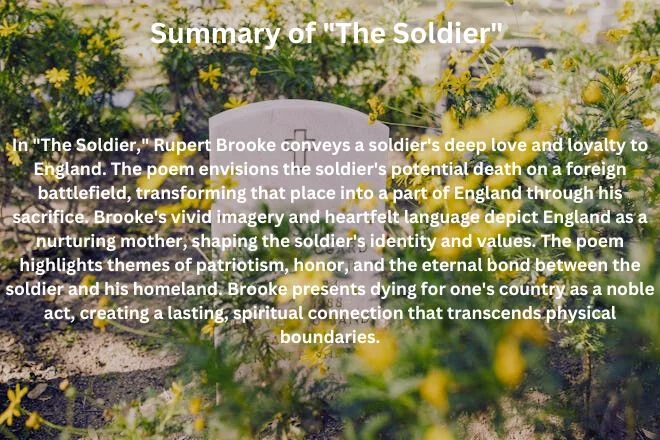
In “The Soldier,” Rupert Brooke expresses a soldier’s profound love for England. The poem begins with the soldier imagining his possible death in a foreign land. He asks readers to remember him as part of England, even if he dies abroad. He believes his sacrifice will make the foreign soil forever English.
Brooke uses vivid imagery to show England as a nurturing mother, shaping the soldier’s identity. Themes of patriotism and eternal connection run throughout the poem. Brooke’s use of enjambment and caesura emphasizes the soldier’s unbroken bond with his homeland. The serene tone and positive imagery reflect an idealized view of war and sacrifice.
Brooke highlights the noble and eternal aspects of dying for one’s country. Through this poem, he shows that the soldier’s spirit remains forever intertwined with England, both in life and death.
Poetic Legacy and Influence of “The Soldier” by Rupert Brooke
“The Soldier” by Rupert Brooke has had a lasting impact on war poetry and English literature. Written in 1914, this sonnet captures the patriotic spirit and idealism that many felt at the start of World War I. Brooke’s heartfelt portrayal of a soldier’s love for his country remains impactful, offering valuable insight into the cultural and emotional context of the era. Let’s look at the factors that contribute to its legacy and influence.
Early War Idealism
Brooke’s poem represents the initial enthusiasm and romantic view of war that were common at the beginning of World War I. Unlike the later, more disillusioned works of poets like Wilfred Owen and Siegfried Sassoon, “The Soldier” reflects a sense of noble sacrifice and eternal connection to one’s homeland. This idealistic perspective offers a snapshot of the sentiments held by many at the war’s outset.
Symbol of Patriotism
“The Soldier” has become a symbol of patriotic literature. Its themes of national pride, sacrifice, and the soldier’s eternal bond with his homeland continue to resonate. The poem’s language and imagery have been used in various commemorations and memorials, reflecting the deep emotional connection it fosters with themes of duty and love for one’s country. Lines like “If I should die, think only this of me: That there’s some corner of a foreign field that is for ever England” have become iconic, often quoted in contexts honoring military service and sacrifice.
Influence on War Poetry
Brooke’s work significantly influenced subsequent war poetry. His idealized view of sacrifice set a benchmark that later poets both emulated and reacted against. While poets such as Owen and Sassoon focused on depicting the harsh realities of war, Brooke’s earlier work offered a contrasting perspective that added depth to the broader landscape of war literature. The difference between Brooke’s idealism and the later poets’ realism offers a comprehensive understanding of the war’s impact on soldiers and society.
Educational and Cultural Impact
“The Soldier” is frequently included in educational curriculums, introducing students to themes of patriotism, sacrifice, and national identity. Its inclusion in literary studies provides a foundation for discussing the broader historical and cultural contexts of World War I. Brooke’s sonnet serves as a gateway for exploring the varied experiences and sentiments of the time, fostering a deeper appreciation for the complexities of war and its representation in literature.
Memorialization and Commemoration
Brooke himself became a symbol of youthful sacrifice, having died early in the war. His untimely death and the idealism in his poetry turned him into a figure of commemoration. “The Soldier” is often recited at Remembrance Day ceremonies and other events honoring fallen soldiers. Its evocative language and emotional depth continue to provide solace and a sense of pride, reinforcing the poem’s place in collective memory and national identity.
Literary Style and Technique
Brooke’s use of the Petrarchan sonnet form in “The Soldier” demonstrates his mastery of traditional poetic techniques. The poem’s structured rhyme scheme, iambic pentameter, and rich imagery have influenced many poets who seek to balance form and emotion in their work. Brooke’s ability to convey powerful themes within a tightly controlled structure is a testament to his skill and has inspired poets to explore similar methods in their writing.
Conclusion
“The Soldier” by Rupert Brooke remains a cornerstone of war poetry and English literature. Its themes of patriotism, sacrifice, and eternal connection to the homeland have left a lasting mark on readers and writers alike. Brooke’s idealistic depiction of a soldier’s dedication to his country remains inspiring, stirring powerful emotions.
This ensures the poem’s strong position in literary history and its ongoing impact on how war is remembered in culture. Through its poetic legacy, “The Soldier” invites reflection on the nobility of sacrifice and the enduring power of national identity.
If you’re captivated by Brooke’s exploration of patriotism in “The Soldier,” don’t miss our analysis of Wilfred Owen’s “Dulce et Decorum Est.” Discover how Owen’s stark, realistic portrayal of war contrasts with Brooke’s idealistic vision. Dive in to explore the differences!
RELATED POSTS
View all


